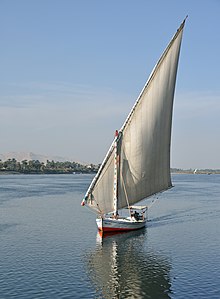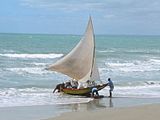Felucca

A felucca (Arabic: فلوكة, romanized: falawaka, possibly originally from Greek ἐφόλκιον, epholkion[1]) is a traditional wooden sailing boat with a single sail used in the Mediterranean—including around Malta and Tunisia. However in Egypt, Iraq and Sudan (particularly along the Nile and in the Sudanese protected areas of the Red Sea), Its rig can consist of two lateen sails as well as just one.
They are usually able to board ten passengers and the crew consists of two or three people.
Egypt[edit]
Despite the availability of motorboats and ferries, feluccas are still in active use as a means of transport in Nile-adjacent cities like Aswan or Luxor. They are especially popular among tourists who can enjoy a quieter and calmer mood than motorboats have to offer.

Feluccas were photographed by writer Göran Schildt's travels on the Nile in 1954-55 as part of his Mediterranean sea travels. Schildt documented them as being called "Ajasor".
San Francisco[edit]

A large fleet of lateen-rigged feluccas thronged San Francisco's docks before and after the construction, at the foot of Union Street, of the state-owned Fisherman's Wharf in 1884.[2] Light, small, and maneuverable, the feluccas were the mainstay of the fishing fleet of San Francisco Bay. John C. Muir, Curator of Small Craft,[3][4] SF Maritime Historical Park, said of them, "These workhorses featured a mast that angled, or raked, forward sharply, and a large triangular sail hanging down from a long, two-piece yard".[5][6] Among the owners of feluccas in San Francisco Bay was the author Jack London, who recollected his adventure as a young oyster pirate in his works.[citation needed]
Felucca Nuovo Mondo[7] built in 1987,[8] sails from San Francisco Maritime National Historical Park[9][10][11][12]
See also[edit]
References[edit]
- ^ El Houssi, Abdelmajid. Retour sur l'étymologie de felouque (PDF). p. 20.
- ^ Muir, John C. (Summer 2000). "Tides of Change: Fisherman's Wharf (1870-1930)". Sea Letter. San Francisco Maritime National Park Association. Retrieved 27 July 2023.
- ^ "Our Team". Friends of China Camp. Retrieved 27 July 2023.
- ^ https://councilofamericanmaritimemuseums.org/wp-content/uploads/2013/07/camm-2017-program-final1.pdf [bare URL PDF]
- ^ Muir, John C. (Summer 2000). "Tides of change: Fisherman's Wharf, 1870–1930". Sea Letter. Archived from the original on August 8, 2006. Retrieved January 30, 2021.
- ^ Muir, John C. (Summer 2000). "Tides of change: Fisherman's Wharf, 1870–1930 (excerpt)". Sea Letter. No. 58. Retrieved January 30, 2021.
- ^ "Felucca Nuovo Mondo Under Sail (Photo)". U.S. National Park Service. Retrieved 27 July 2023.
- ^ "A guide to the San Francisco Maritime National Historical Park Photo Lab records, 1963-2014". oac.cdlib.org. Retrieved 27 July 2023.
Online Archive of California is a service of the UC Libraries, powered by the California Digital Library
- ^ Gaudreau, Ernest (6 November 2008). "Felucca Novo Mondo, San Francisco Maritime National Historical Park". princebart. flickr. Retrieved 27 July 2023.
- ^ "Sausalito Herring Festival". Latitude38. 8 February 2013. Retrieved 27 July 2023.
The felucca Nuovo Mondo and the Wettons' Monterey will be on display — on Sausalito YC moorings — at the Sausalito Herring Festival tomorrow.
- ^ "Felucca Nuovo Mondo Says Farewell To The Shore". Gallery Item Display. nps.gov. Retrieved 27 July 2023.
- ^ "small boats on display at Hyde Street Pier (Video)". San Francisco Maritime National Historical Park. U.S. National Park Service. 27 July 2023. Archived from the original on 2023-07-27. Retrieved 27 July 2023.
Further reading[edit]
- Muscat, Joseph (2003) The Gilded Felucca and Maltese Boatbuilding Techniques. Pubblikazzjonijiet Indipendenza, Malta. ISBN 99932-41-45-8


